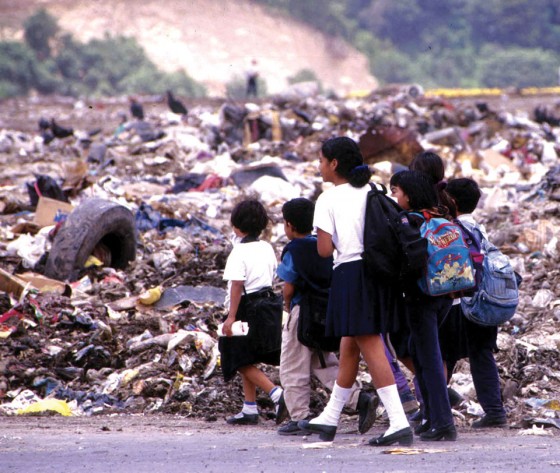Safe Passage
One volunteer’s overwhelming experience serving in the city dump
written by Hannah Wallace Bowman
Every day at 7:15 a.m., a bleary-eyed group of Westerners gathers on the pavement outside La Antigua Guatemala’s San Francisco Church. Clutching banana bread and paper cups of steaming coffee, they soak up the early morning sun. Preparing to make their way into one of the infamous red zones of Guatemala City, they are a diverse bunch, comprising people from all over the world; their ages and motivations vary, and each of them has a unique reason as to how they came to be waiting for this particular bus.
Yet, they all have a shared destination: These are the volunteers of Camino Seguro (Safe Passage), a non-profit organization that provides hope, education and opportunity to the basurero community of the capital.
Basurero is the Spanish word for dump, of which Guatemala boasts one of the biggest in Central America. Taking up 40 acres of a huge ravine that runs through the city, the dump receives over 500 tons of domestic, chemical and medical waste daily. The people in the surrounding neighborhoods make their living by harvesting materials from the landfill for recycling—gathering cans, paper and metals to sell for a few quetzals—and it is this community that Safe Passage was created to serve.
Since it was conceived in 1999, when a young woman named Hanley Denning opened the doors of a small rented apartment in the heavily populated margins of the tip, offering the children who were foraging in the rubbish a safe space to come and do their homework, the organization has continued to grow. Today it works with approximately 300 families, providing refuge and educational reinforcement to over 550 at-risk women and children.
Whether you are a classroom assistant, a teacher, a tutor in the adult literacy program, a social worker or a kitchen porter, there really isn’t such thing as a “typical day” at the project. In my last eight months as an English teacher, every day has offered something new. I have been given the opportunity to work with a demographic I wouldn’t ordinarily have access to and have experienced almost every spectrum of emotion possible, from the intensely negative to the euphoric. It has been this diversity and intensity that has made the experience rewarding in such a way that only a true challenge can be.
The kids and mothers typically come from backgrounds that can make it a struggle to push past their streetwise exterior. After arriving on my first day expecting to be greeted by smiles and open arms, I quickly learned that building relationships with individuals who exist in the harsh reality of an inner-city slum can be tough and unpredictable. Trust is an issue in these barrios policed by gangs, as is violence and substance abuse. There is an educated suspicion and distance toward new people, unsurprising in a context where life is anything but easy and people learn quickly the art of self-preservation to survive.

Garbage trucks line up to offload 500 tons of domestic, chemical and medical waste daily photo by Joseph del Conzo
The volunteers, whether they are short term (minimum of five weeks) or long haul, are expected to treat their commitment to the organization as they would a job. This means 10 hours a day, five days a week, and a clearly defined set of responsibilities with no sleeping in for a hangover. It’s a tough schedule but it makes for a collection of dedicated and close individuals, who take what they do seriously. Spending so much time together in such an emotive environment forges strong and long-lasting connections between the folks of Safe Passage, while to an outsider, “The Camino Crew” may seem a strange phenomenon, displaying pack-like characteristics and tending to travel together as a unified mass, hosting parties where they take turns picking lice out each other’s hair.
I am now coming to the end of my time with the project. Although I fear that this was probably lost in translation, I have been trying to explain to the kids how they have affected me so much more profoundly than I could have possibly have hoped to affect them. If I have managed to give back even one percent of what I have taken away from this overwhelming experience, I can hold me head up high. It is with a heavy heart that I remove my signature green T-shirt for the last time and say farewell to a place that has changed me forever.
To volunteer, sponsor a child or for more information, visit www.safepassage.org
